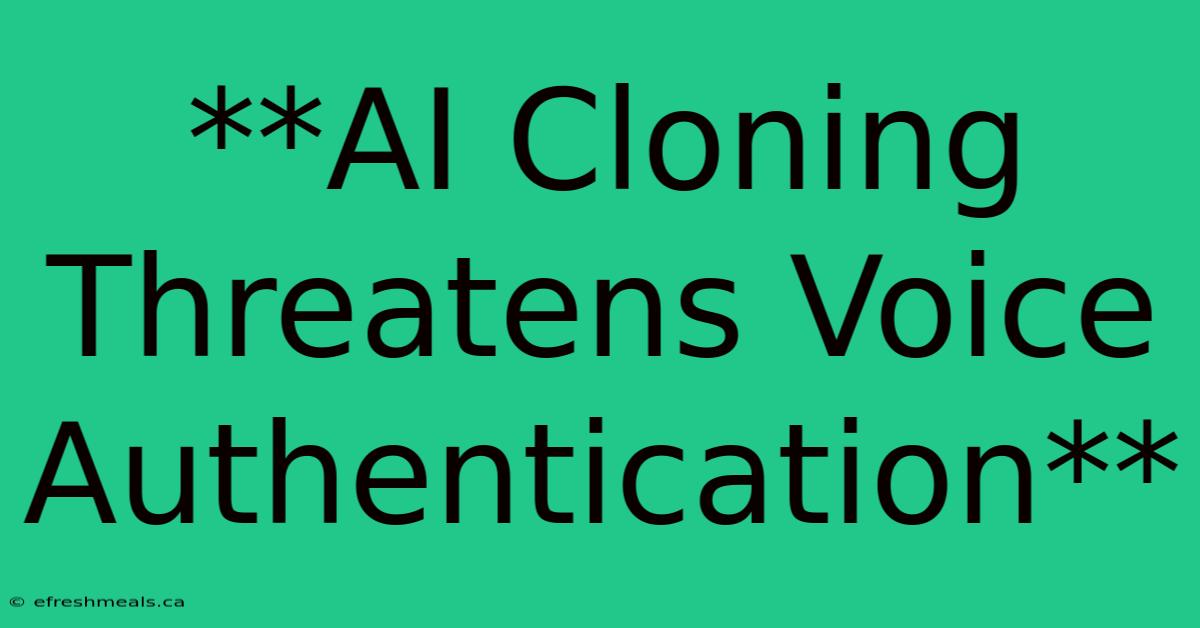**AI Cloning Threatens Voice Authentication**

Discover more detailed and exciting information on our website. Click the link below to start your adventure: Visit Best Website nimila.me. Don't miss out!
Table of Contents
AI Cloning Threatens Voice Authentication: Is Your Voice Safe?
Editor’s Note: Recent advancements in AI technology have produced incredibly realistic voice clones. This raises serious concerns about the security of voice authentication systems.
Why It Matters: Voice authentication, long considered a secure and convenient form of access control, is now facing a significant challenge from AI-generated voice cloning. As AI becomes more sophisticated, the ability to create convincing voice replicas poses a threat to sensitive data and financial security. This article delves into the threat of AI cloning to voice authentication, exploring its potential impact on various sectors.
Key Takeaways of Voice Authentication Security:
| Aspect | Impact |
|---|---|
| Vulnerability: | AI clones can bypass voice authentication systems, potentially compromising access to sensitive data and financial accounts. |
| Consequences: | Increased fraud, identity theft, and unauthorized access to personal information. |
| Mitigation: | Development of more robust voice authentication techniques and improved AI detection methods. |
AI Cloning: A Growing Threat
The rise of AI-powered voice cloning technology presents a significant security risk to voice authentication systems. These systems rely on unique vocal patterns to verify identity. However, AI can now create extremely realistic voice replicas, enabling malicious actors to bypass authentication systems and gain unauthorized access.
AI Voice Cloning: How It Works
AI voice cloning involves training deep learning models on large datasets of a person's voice. This training process allows the AI to learn the nuances and patterns of an individual's speech. Once trained, the AI can synthesize new audio that sounds remarkably similar to the original voice, effectively mimicking it.
Real-World Implications
The potential for AI voice cloning to disrupt voice authentication is significant. Here are some key areas of concern:
1. Financial Security: AI-generated voice clones could be used to make unauthorized transactions over the phone or online, resulting in financial losses for individuals and businesses.
2. Identity Theft: With AI-cloned voices, perpetrators could impersonate victims to gain access to personal data, leading to identity theft and fraudulent activities.
3. Legal and Ethical Issues: The potential for voice manipulation raises significant legal and ethical concerns, particularly in areas like audio recordings of testimonies or contracts.
Defending Against AI Cloning
Recognizing the growing threat of AI cloning, experts and researchers are actively working on solutions to enhance voice authentication security. Key strategies include:
1. Advanced Voice Recognition Techniques: Developing more sophisticated algorithms that can identify subtle variations in speech patterns, making it more difficult for AI-cloned voices to bypass authentication.
2. Multi-Factor Authentication: Combining voice authentication with other security measures, such as PIN codes or biometrics, can significantly reduce the risk of unauthorized access.
3. AI-Powered Detection: Developing AI-powered systems to detect and identify AI-generated voices, providing an additional layer of protection against cloning.
4. User Education: Raising awareness about the risks of AI voice cloning and encouraging users to practice good security habits, such as updating security software and being cautious about suspicious communications.
FAQ: AI Cloning and Voice Authentication
1. How can I protect myself from AI voice cloning?
Answer: Use strong passwords, enable multi-factor authentication on your accounts, be cautious about suspicious calls or communications, and stay informed about the latest security threats.
2. Is it illegal to create AI voice clones?
Answer: The legality of AI voice cloning varies depending on the context and the specific use case. It is important to consult legal counsel to ensure compliance with applicable laws and regulations.
3. What are the future implications of AI voice cloning?
Answer: AI voice cloning technology is still evolving, and its future implications are unclear. However, it is likely to play an increasingly significant role in both beneficial and potentially harmful applications.
Tips for Protecting Your Voice
1. Be Cautious of Suspicious Calls: If you receive a call from someone claiming to be from your bank or another trusted institution, always verify the identity of the caller before sharing any sensitive information.
2. Use Strong Passwords and Multi-Factor Authentication: Protect your online accounts with strong passwords and enable multi-factor authentication whenever possible.
3. Keep Your Devices Secure: Install security updates regularly and use strong antivirus software to protect your devices from malware.
4. Be Aware of Social Engineering Tactics: Be cautious of emails or communications that ask for personal information, even if they appear to be from legitimate sources.
5. Stay Informed: Stay up-to-date on the latest security threats and best practices by following reputable cybersecurity resources.
Summary of AI Cloning and Voice Authentication
The threat of AI cloning to voice authentication is a serious concern for individuals and businesses alike. As AI technology continues to advance, the potential for AI-generated voice clones to disrupt traditional security measures grows. However, by implementing robust security practices and staying vigilant, we can mitigate the risks and protect ourselves from this emerging threat.
Closing Message: The emergence of AI voice cloning highlights the importance of proactive security measures and constant adaptation in the face of evolving technological threats. By embracing innovation and collaborating to develop effective countermeasures, we can work towards a future where our voices remain secure.

Thank you for visiting our website wich cover about **AI Cloning Threatens Voice Authentication**. We hope the information provided has been useful to you. Feel free to contact us if you have any questions or need further assistance. See you next time and dont miss to bookmark.
Featured Posts
-
Peanut The Squirrel Euthanized In Ny
Nov 03, 2024
-
Berkshire Hathaways 3 Q 2024 Earnings Analysis
Nov 03, 2024
-
Pitts Qb Recruitment Strategy Future Classes
Nov 03, 2024
-
Ny Home Seized Peanut Squirrel Euthanized
Nov 03, 2024
-
Social Media Squirrel Peanut Euthanized
Nov 03, 2024
